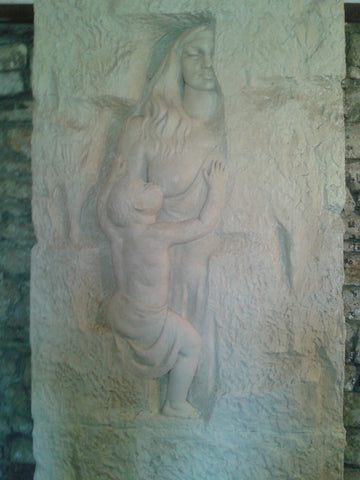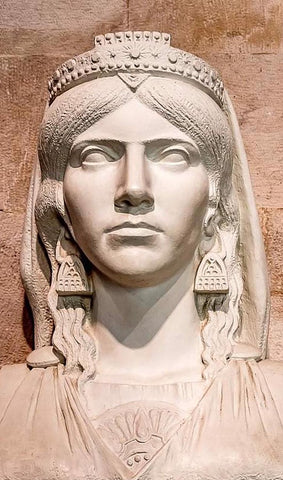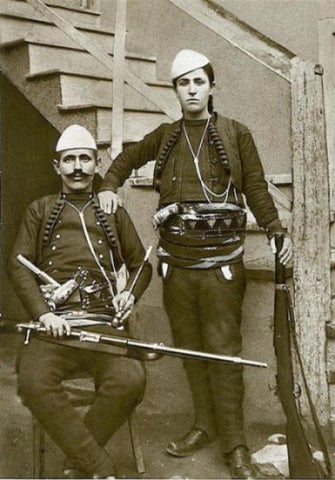March 8th marks International Women’s Day around the world. A holiday dedicated to raising awareness about gender related issues such as reproductive rights, violence against women and gender equality.
In Albania, traditionally, International Women’s Day is celebrated by purchasing and gifting of mimosa flowers to the women in one’s life; mothers, sisters, friends, and colleagues. When talking to the editors of Shqipful about the possibility of writing a post for the blog – my mind immediately went to writing a post about women – specifically, the Albanians women who have made us what we are today. The sung and unsung heroines of our nation.
Being an anthropologist – or more specifically – an archaeologist, I wanted to take deep dive into our history, and mythology, to include figures that we may not know much about, but whose stories are deeply ingrained in the fabric of our society as a people. While I would have loved to give every notable Albanian woman her much deserved due, because of time and space constraints, today I will focus on three; Rozafa, Mbreteresha Teuta and Shote Galica.
I want to begin this narrative with Rozafa, whose story I am sure we all know. The dutiful wife and mother who sacrificed her life for that of her people. The story goes that three brothers struggled to build the walls of the castle, finding their work undone each morning when they returned. One day, an elder told them that in order to be successful, they must sacrifice one of their wives, who is to be buried alive in the foundation walls. Only then will the castle stand. When faced with the dilemma of whose wife would be sacrificed, the elder said that it would be the one who brings lunch the next day. He made the brothers swear an oath (besa) that they would not warn their wives of the this prophecy, an oath that only the youngest kept. It was his wife, Rozafa who brought lunch the next day, and who was to be buried alive. When she was told her fate, Rozafa did not object. But she made one request; that half her body remain outside the wall, so that she could raise her infant son. So Rozafa was interred in the wall, and Shkodra castle was constructed. And to this day, it is said that the milk from Rozafa’s breast drips from the walls of the castle – a testament to her sacrifice and love for her son.

There are many themes in this story that reflect core aspects of Albanian culture, and more specifically, the role of women within our culture. The archetype of the dutiful wife and the devoted mother for example. But more profoundly, the symbology that our society (and all others for that matter) are built on the backs of women. On their sacrifice, on their labor, on their subjugation. This is something that my fellow Albanian colleagues and I discuss on our Instagram platform @AlbaniansActiveNow. But zooming out a little, the concept women as pillars of society is a constant one that spans time and various cultures. In the ancient world one only needs to look at the temples that adorned Acropolis with their caryatid pillars. A famous example is the Erechtheion in Athens.

Shkodra castle was built originally in the 4th or 3rd century BC. Around the same time, in the end of the 3rd C BC, another Illyrian woman was making waves, literally, further north, in the Adriatic. Queen Teuta of the Ardiaei. Despite being a real historical figure, what we know about Teuta is limited before her wars with Rome, and what written sources we do have are overtly hostile to her both as a woman and as an Illyrian. She rose to power as regent of the Illyrian Kingdom of the Ardiaei after the death of her husband Agron. While we don’t know the extent of her kingdom, we do know that it was a coastal one, spanning the Adriatic coast of modern-day Albania into Montenegro. In popular culture, Teuta is most famous, or infamous, for encouraging piracy in the Adriatic, which brought on the Illyrian wars, and eventually lead to the incorporation of Illyria in to the Roman empire.

There are two main themes I want to address from Teuta’s story. The first is the sheer misogyny she received from contemporary Roman historians who discredited her as a ruler. One does not need to be an expert historian to pick out Polybius’s bias against Teuta because of her sex (Polybius, Histories).Historians today have argued that this hostility was intentional, and likely exaggerated to justify Rome swooping in and waging war on the Illyrians. While some have criticized Teuta for “provoking Rome” and leading to the downfall of her kingdom, many fail to realize that Rome was like going to invade anyways and was just looking for an in (my humble opinion).
But more importantly, can we knowledge how profound it is that in the 3rd C BC, an entire kingdom was led by a woman. A time when her contemporaries in Rome and Greece have no public life and were confined to the walls of their homes, Teuta ran a kingdom. This is something that my female Albanian colleagues and I have discussed many times over when talking about Albanian prehistory – over a kafe turke of course. While the Greek and Roman historians loved to paint the Illyrians as backwards “barbarians,” the Illyrians had a female leader. That sounds pretty progressive to me. Her story challenges our understanding of gender roles and norms in our society. Women ruled kingdoms in our past, yet today men murder their wives in our country and face little to no repercussions.
Fast forwarding hundreds of years, we come to the early 20th’s century, a time of great tension in the Balkans. With the Ottoman empire fading and neighboring countries looking hungrily at the former holdings of the Turks; the Albanian people found themselves fighting for their nation and the right to self-determination. A battle that has its roots decades earlier in the wake of the Albanian national awakening. A key figure, and decorated heroine of the people from this time is Shote Galica. Born in Drenica, and married at a young age to Kacak leader, Azem Galica, Shote joined her husband in multiple important battles, including the famous Uprising of Dukagjin, in Runik against Serbian forces from 1921-23. Her abilities as a gifted military leader and fighter are confirmed by the fact that she took over as leader of her husband’s guerrilla forces after his untimely death in 1925. Shote would continue to fight for the liberation of her people until 1927, when it is believed she was wounded or fell ill (or both) which caused her to retreat to Fushe Kruje, where she died.

With Shote similar themes arise; duty (and love) for one’s country and challenging of gender norms. Shote is celebrated as one of the greatest soldiers of our nation, yet she was a woman living in a time where this identity was not one usually held by women. This is an argument others have made before, see Fortesa Latifi’s post for Kosovo 2.0 in 2016 (Linked here). While in Albania, we have a long history of women taking on men’s roles in the case of the Burrnesha key to being a Burrnesh was to swear off marriage; and Shote was married. Another condition is that despite being married, Shote never had any biological children – that survived to old age that is (although this is contested – some sources say she adopted children who were orphaned by the fighting). Shote’s case is exceptional, created in early parts by circumstance (war and who she was married to) and her own charisma, determination and devotion to freedom.
I have shared the stories of three amazing women, who lived (or not) in three vastly different times, yet shared similar struggles navigating the oppressive and patriarchal societies they lived in. Dutiful wives, who, when faced with threats against their people, sacrifice their own lives, for that of their people, their nation. A nation that is built upon and upheld by their daughters, and daughters’ daughters.
Which brings us to the present day. March 8th 2024. As we celebrate International Women’s Day I want to remind you dear reader to celebrate the unsung heroines around you. The women whose labor and sacrifice our current nations stand on. The many brave, fearless, trailblazing women of Albania, Kosova and the diaspora today. The mothers, teachers, sisters, doctors, activists, nurses, writers, artists, and politicians (the list goes on and on) around us, who are challenging gender norms, fighting for freedom, equality, and against oppression. Celebrate these women not only today but every day of the year. Not only with flowers with with actions. In a society where violence against our women is not only tolerated but considered the norm, answer their calls for justice. For these women are the Shotes, Teutas and Rozafas of today, fighting in a very different battlefield, but fighting nonetheless for freedom and equality.
-------
Erina Baci is an archaeologist working in Albania and Kosova and a PhD candidate at the University of Michigan. She likes to share her insights in various publications as well as in her social media. You can follow her at @thealbanianarchaeologist

------
Resources
Teuta:
https://www.albanopedia.com/biographies/teuta
Polybius. Histories. https://www.perseus.tufts.edu/hopper/text?doc=Perseus%3Atext%3A1999.01.0234%3Abook%3D2%3Achapter%3D8
Rozafa:
For a feminist discussion of the myth of Rozafa by my fellow Albanian colleagues and I: https://www.instagram.com/p/CMI2tzTllYU/
Elsie, Robert. 1994. Albanian Folktales and Legends. CreateSpace Independent Publishing Platform.
Shote:
Elsie, Robert.2004. Historical Dictionary of Kosova. The Scarecrow Press.
Latifi, Fortesa. 2016. From Azem Galice to Shote Galiza. Kosovo.2.0
https://kosovotwopointzero.com/en/from-azem-galice-to-shote-galica/
Burnesha
Image information (all images are public domain)
Erechtheion : Image CC BY-SA 2.5 Thermos, Wikimedia Commons. http://commons.wikimedia.org/wiki/File:Porch_of_Maidens.jpg
Teuta: https://commons.wikimedia.org/wiki/File:Queen_Teuta_of_Illyria.jpg
Shote: https://commons.wikimedia.org/wiki/File:Shote_Galica.jpg
Rozafa: https://commons.wikimedia.org/wiki/File:Albania_Shkoder.jpg




